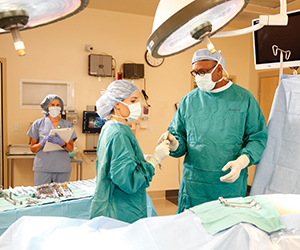A
B
C
D
E
F
G
H
I
J
K
L
M
N
O
P
Q
R
S
T
U
V
W
X
Y
Z
Click a letter to see a list of conditions beginning with that letter.
Click 'Topic Index' to return to the index for the current topic.
Click 'Library Index' to return to the listing of all topics.
The Surgical Team
When you have surgery, a team of medical staff helps the surgeon during the operation. Who is on the team depends on the type of surgery. Most teams include the following providers.

Surgeon
A surgeon has finished 4 years of medical school and 4 or more years of special training (residency) after medical school. Most surgeons have passed exams for board certification. The American Board of Surgery is the national group that gives this certification for general surgery in the U.S. Some surgeons also have the letters FACS after their name. This means that the surgeon has met the requirements to become a member of the Fellows of the American College of Surgeons (FACS). The FACS status denotes competence and quality.
Anesthesiologist
An anesthesiologist has finished 4 years of medical school and 4 years of special training in anesthesia. They may get more training in certain surgery specialties. This might be neurosurgical anesthesia or cardiac anesthesia. The anesthesiologist takes part in all phases of surgery.
Certified registered nurse anesthetist (CRNA)
A nurse anesthetist gives you anesthesia care before, during, and after surgery or labor and delivery. The nurse constantly watches every important function of your body. They can change the anesthesia medicine to make sure you are safe and comfortable. A nurse anesthetist has a bachelor's degree in nursing and at least 1 year of experience as a registered nurse in a critical-care setting. A CRNA also has at least a master's degree from a nurse anesthetist program. Nurse anesthetists must pass a national certification exam to become CRNAs.
Operating room nurse or circulating nurse
Registered nurses are registered and licensed by each state to care for patients. Some nurses focus on a certain field, such as surgery. The operating room nurse helps the surgeon during surgery. Operating room nurses are certified in various areas of surgery. Nurses must pass an exam to be certified.
Surgical tech
Surgical techs help with the surgery by setting up a sterile operating room. They get supplies and surgery tools ready. And they hand the surgeon the tools needed. In addition, they can help the surgeon during certain procedures. They must pass an exam to be certified by the National Board of Surgical Assisting (NBSTA).
Residents or medical students
In many teaching hospitals, resident providers in training and medical students may be a part of the surgical team.
Physician assistant (PA)
Physician assistants (PAs) practice medicine under the supervision of a licensed healthcare provider in most states. They may act as an assistant to the surgeon and do things like close incisions with stitches (sutures) or staples.
Medical device company representative
Sometimes surgeons will have a representative from a company that makes medical equipment in the operating room. This might include artificial joints, spine stabilizers, or pacemakers. The representative can help the surgeon with sizing and function of the equipment.
Online Medical Reviewer:
Mahammad Juber MD
Online Medical Reviewer:
Marianne Fraser MSN RN
Online Medical Reviewer:
Raymond Turley Jr PA-C
Date Last Reviewed:
2/1/2024
© 2000-2025 The StayWell Company, LLC. All rights reserved. This information is not intended as a substitute for professional medical care. Always follow your healthcare professional's instructions.